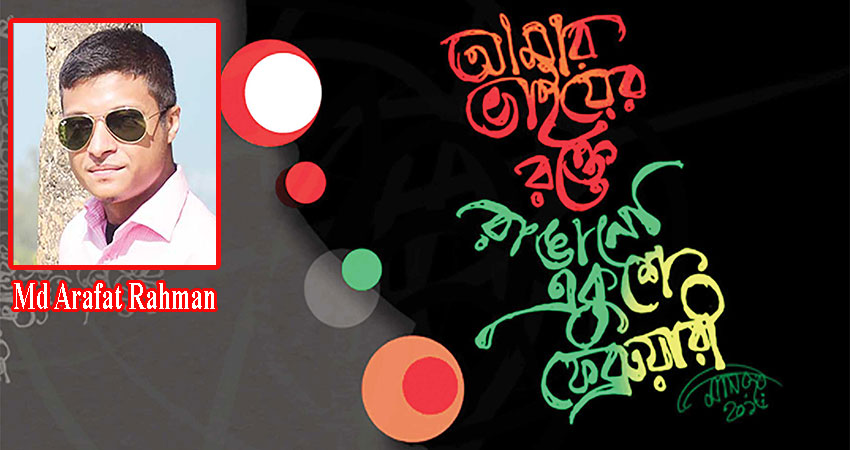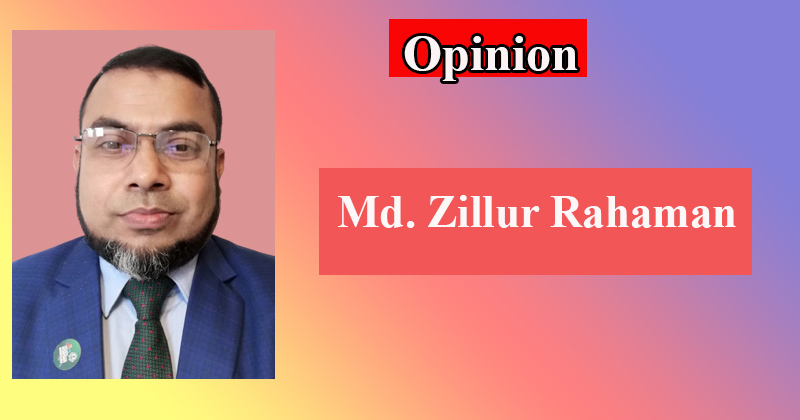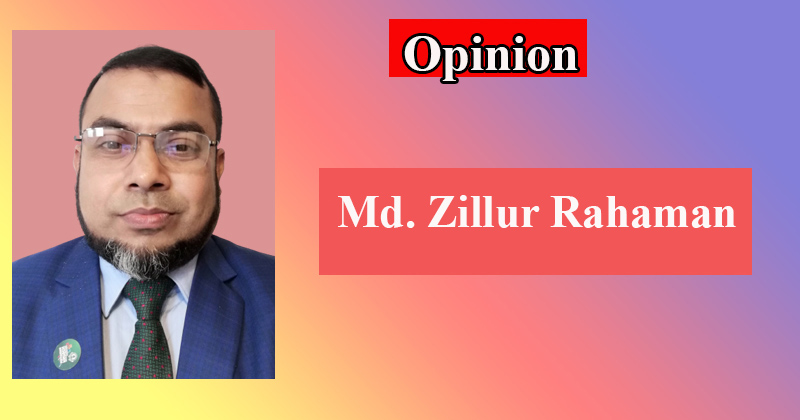Ekushey February is a glorious day for all Bengali speaking people all over the world including Bangladesh. It is well known as Martyrs Day and International Mother Language Day. It has been marked as a day of tragic and glorious memories of the language movement of the Bengali people. On this day in 1952 (Thursday, 8 Falgun, 1358), many young minds were martyred in the police firing on the students who were protesting for making Bengali one of the state languages of East Pakistan.
Rafiq, Jabbar, Shafiul, Salam and Barkat were some of them. That is why this day has been marked as Martyr's Day. International Mother Language Day is observed on 21st February every year as per the decision taken by the United Nations on 5th August, 2010. British rule in the subcontinent ended in 1947 and two independent states, India and Pakistan, were born. The 44 million Bengali speaking people of East Bengal became part of the Pakistani Empire. Soon after independence, the question arose as to what would be the state language of Pakistan.
Central leaders of Pakistan and Urdu-speaking intellectuals said that Urdu would be the state language of Pakistan. On the other hand, there was a demand from East Pakistan that Bengali should also be made one of the state languages. But the central government of Pakistan completely ignored this demand. This angered the students and intellectuals of Dhaka and they prepared a final demand for language. The demand is: Bengali will be the medium of instruction in education and government affairs in East Pakistan and at the central government level the state language of Pakistan will be Bengali and Urdu.
On the other hand, in various forums of the central government in West Pakistan, at the initiative of Education Minister Fazlur Rahman, efforts were made to make Urdu the only state language of Pakistan. The students of East Pakistan were outraged. In Dhaka, students rallied under the leadership of Professor Abul Quasem, the founder of Tamaddun Majlis. They organized a student meeting on the premises of Dhaka University on 6 December 1947 demanding to make Bengali one of the state languages.
The meeting decided to make Bengali an official language of Pakistan and a medium of instruction in East Bengal. The procession-protest continues even after the meeting. Later this month, the Rashtrabhasha Sangram Parishad was formed, convened by Professor ASM Nurul Haque Bhuiyan of Tamaddun Majlis. At the next session of the Pakistan Constituent Assembly held in Karachi on 23 February, it was proposed that the members of the council address in Urdu or English.
But by amending the proposal, Dhirendranath Duatta, a member of the East Pakistan Congress party, demanded that Bengali be made one of the languages of the council. He said that out of 69 million people in Pakistan, 44 million are from East Pakistan, whose mother tongue is Bengali. But this demand was rejected when the central leaders including the Prime Minister Liaquat Ali Khan and the Chief Minister of East Bengal Khwaja Nazimuddin opposed it. When the news reached Dhaka, the students, intellectuals and politicians were outraged. Later a new Rashtrabhasha Sangram Parishad was formed to conduct the movement which was convened by Shamsul Alam.
March 11, 1948 is a memorable day in the history of language movement. A general strike was observed in Dhaka on the same day in protest of the exclusion of Bengali from the language list of the Constituent Assembly and the non-use of Bengali in Pakistan's currency and stamps and the exclusion of Bengali from the examination for recruitment in the Navy. The demand was to declare Bengali as one of the state languages of Pakistan and the official language of East Pakistan. Shawkat Ali, Kazi Golam Mahbub, Shamsul Haque, Oli Ahad, Sheikh Mujibur Rahman, Abdul Wahed and others were arrested while marching with the slogan 'Rashtrabhasha Bangla Chai' in support of the strike.
Student leaders including Abdul Matin and Abdul Malek Ukil also took part in the procession. There was a huge meeting on the campus. Later the strike was observed on 12-15 March. On 19 March 1948, the Governor General of Pakistan Muhammad Ali Jinnah visited East Pakistan. He addressed two meetings in Dhaka and in both places he ignored the demand for Bengali language and declared Urdu as the only state language of Pakistan. At that time the language movement spread all over East Pakistan. Jinnah's remarks drew strong protests. The Rashtrabhasha Sangram Parishad was formed on 11 March 1950 at Dhaka University with Abdul Matin as its convener.
From the beginning of 1952, the language movement took an important turn. At that time Khwaja Nazimuddin became the Prime Minister of Pakistan. As the political crisis intensified, so did the economic situation in East Pakistan. The people of East Pakistan continue to lose confidence in the Muslim League. The new political party Awami League was formed in 1949 under the leadership of Maulana Abdul Hamid Khan Bhasani. Feelings of deprivation and exploitation continue to grow in East Pakistan, and the people here are increasingly convinced that they have been replaced by another type of colonialism in place of British imperialism. In this context, the language movement got a new dimension in 1952.
Khwaja Nazimuddin came to Dhaka from Karachi on 26 January 1952. He said in a public meeting at Paltan Maidan that the people of the province would decide which language would be used in the official functions of the province. But the only state language of Pakistan will be Urdu. Immediately there was a strong reaction and the students started protesting under the slogan 'Rashtrabhasha Bangla Chai'. The 'All-Party Central State Language Struggle Council' was formed at a meeting of representatives of various political and cultural parties chaired by Awami League President Maulana Bhasani on January 31, convened by Kazi Golam Mahbub.
On 21 February, the Rashtrabhasha Sangram Parishad decided to organize strikes, public rallies and demonstrations all over East Pakistan. While organizing these programs, the government issued section 144 ban on rallies in Dhaka city. On the evening of 20 February, a meeting of the Central State Language Struggle Council was held under the chairmanship of Abul Hashim. The meeting disagreed on the question of whether section 144 would be violated, but the students remained adamant in their determination to break section 144.
The next day at 11 am a meeting of the students was held on the ground floor of Dhaka University located in a part of Dhaka Medical College. When the meeting started, the Vice Chancellor along with some teachers of the university requested the students not to violate Section 144. However, the student leaders, especially Abdul Matin and Gaziul Haque, remained steadfast in their position. Thousands of school-college students of Dhaka city gathered at the university.
The students took to the streets in small groups of five or seven with the slogan 'Rashtrabhasha Bangla Chai' and the police attacked them. The female students were not spared from the attack too. Police used tear gas when students started throwing bricks at the police. Failed to cope with angry students, police fired on the advanced procession on the Constituent Assembly building. Rafiq Uddin Ahmed, Abdul Jabbar and Abul Barkat were killed in the firing. Many of the injured were taken to hospital, and Abdus Salam, a peon of the secretariat, died.
The next day, February 22, was a day of mass protests and police brutality. The people offered funeral prayers and held mourning processions. Police and military charged sticks, bullets and bayonets on the procession. Several people including Shafiur Rahman were martyred and many others were injured. A memorial was built on February 23 at the site where the students were shot dead. In 1963, a concrete memorial was constructed on the site of this temporary construction site.
The Constituent Assembly passed a bill recognizing Bengali as one of the state languages of Pakistan. The language movement continued till 1956. The movement achieved its goal by approving Urdu as well as Bengali as the state language of Pakistan in the Pakistan National Assembly. At one stage of the debate in the National Assembly, both Bengali and Urdu were recognized as the state languages of Pakistan as per the amendment proposed by its member Adeluddin Ahmed of Faridpur.
An official and symbolic sculpture, the Shaheed Minar, has been constructed at the site of the massacre to commemorate the movement. The 'Bangla Language Introduction Bill' was passed in the Jatiya Sangsad on 26 February 1987, which became effective on 8 March 1987. On November 17, 1999, UNESCO declared February 21 as International Mother Language Day. Through this decision, the international community held the language movement of Bangladesh in a dignified position.
Writer: Columnist, and Asst Officer, Career & Professional Development Services Department (CPDS), Southeast University.
Citizentimes/OH/MY



















